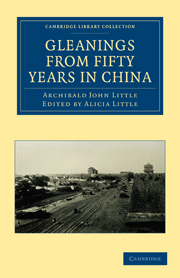Book contents
- Frontmatter
- FOREWORD
- EDITORIAL NOTE
- Contents
- PART I TRADE AND POLITICS
- WESTERN CHINA: ITS PRODUCTS AND TRADE
- BRITISH TRADE WITH CHINA
- EX ORIENTE LUX
- TWO CITIES: LONDON AND PEKING
- THE VALUE OF TIBET TO ENGLAND
- THE PARTITION OF CHINA
- HOW TO REGISTER YOUR TRADE MARK
- PART II TRAVEL
- PART III DRAMA AND LEGEND
- PART IV RELIGION AND PHILOSOPHY
- INDEX
- Plate section
THE PARTITION OF CHINA
Published online by Cambridge University Press: 10 November 2010
- Frontmatter
- FOREWORD
- EDITORIAL NOTE
- Contents
- PART I TRADE AND POLITICS
- WESTERN CHINA: ITS PRODUCTS AND TRADE
- BRITISH TRADE WITH CHINA
- EX ORIENTE LUX
- TWO CITIES: LONDON AND PEKING
- THE VALUE OF TIBET TO ENGLAND
- THE PARTITION OF CHINA
- HOW TO REGISTER YOUR TRADE MARK
- PART II TRAVEL
- PART III DRAMA AND LEGEND
- PART IV RELIGION AND PHILOSOPHY
- INDEX
- Plate section
Summary
This article was published in the Asiatic Quarterly in 1898 and, short though it is, is unfortunately still worth the reading for all those likely to have any influence on the conduct of affairs in the Far East.
—A. E. N. L.The above sinister phrase has been much in men's mouths, and the heinous actions it calls up may become accomplished facts if Britain does not come forward and take the lead in averting from China the fate of Poland; for China is politically weak through the corruption of its rulers and the unwarlike character of its people. The corruption of the mandarinate I attribute to the evil system of paying the officials nominal salaries and allowing them to farm the revenue: pay them well, in ratio of their responsibilities and of the position and staff they are called upon to maintain, and I believe this great evil that now permeates the Chinese bureaucracy would disappear. Even as it is, incorruptible mandarins are not uncommon, i.e., officials who will not take bribes and who do not collect more revenue from their districts than is actually needed for administration and remittance to headquarters; but, human nature being what it is—if officials are allowed to tax at discretion, have no real audit of accounts, and it is merely stipulated that a certain sum must be handed over as nett revenue, the majority of men, be they Mongol or Caucasian, will not neglect the opportunity of feathering their own nests; especially when, by the rules based upon the suspicion of their Manchu conquerors, office is held at the outside for a term of three years, and that never in the native province of the official, but in what is, to all intents and purposes, a foreign country.
- Type
- Chapter
- Information
- Gleanings from Fifty Years in China , pp. 98 - 104Publisher: Cambridge University PressPrint publication year: 2010First published in: 1910

